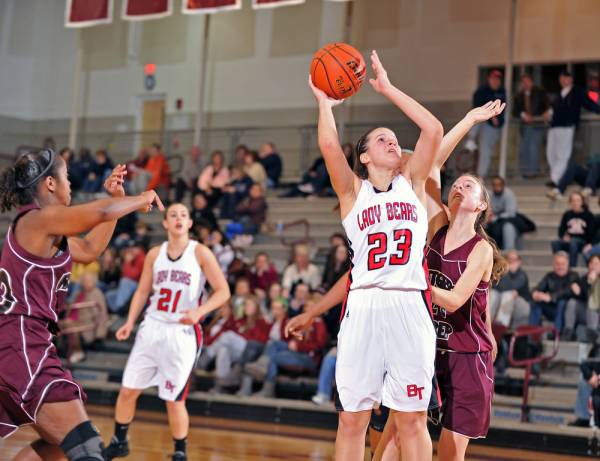As adults, we recognize the signs of stress and overscheduling and are able to control some of the competing variables, but what about children and their stressors?
As the school bells ring to start another academic year and whistles shrill to start another sports season, how does the student athlete manage to achieve good grades and retain optimal performance on the playing field?
Sports Can Make You Better at School
With an emphasis on children specializing in one sport, year round, the stress of doing well in a sport can easily override the necessity to do well in school. But this does not have to be the case for student athletes. Statistically, research indicates that youth who participate in sports, whether school or community sports, perform better academically than children who do not participate in sports.
In his book Sport in Society, sociologist Jay J. Coakley wrote:
Studies have shown consistently that when compared with students who do not play varsity sports, high school athletes, as a group, generally have better grade point averages, more positive attitudes towards school, more interest in continuing their education after graduation, and a slightly better educational achievement rate.
The topic of the student athlete often lends itself to debate regarding the decrease of recess and physical education classes in schools, as well as placing increasing demands on schools to perform well on standardized tests. In a collaborative article written by Doctors Pellegrini and Bohn-Gettler entitled, The Benefits of Recess In Primary School, their research stated:
When the No Child Left Behind Act passed in 2001, recess time continued to be cut further as legislative pressures motivated schools to meet standards for achievement (Fedewa & Ahn, 2011; Jarrett & Waite-Stupiansky, 2009). In fact, 40% of public schools either got rid of, or planned to get rid of, at least one daily recess period (Bland, 2005; G. Klein, 2006), and most schools do not actually require daily recess periods (National Association for Sport and Physical Education & American Heart Association, 2010).
While briefly addressing this contentious issue, the mainstay of this article is to identify the need for balance between academics and athletics, and to offer the student athlete a means to achieve success both in school and on the playing field.

Finding Balance Between School and Sports
How do student athletes achieve the balance between school and sports? By identifying time-saving tips and techniques and by implementing these strategies, the student athlete can succeed academically, as well as athletically.
- Get organized and stay organized. Use a big desk calendar for school and sports. Write down all due dates for schoolwork, projects, and papers. Write down all sports practices and games. Every week revisit your calendar and make corrections.
- Manage your time. With competing demands placed on your time, you must plan your known time schedule. Known times are school time, game and practice time, and travel time to and from school, as well as travel time to and from sports practices and events. By blocking this known time on your calendar, you can determine your actual homework time and study time.
- Plan your week; don’t let your week plan you. Look at your calendar and note when you have projects due, tests scheduled, and practices and games scheduled. Plan how you will study and when you will study.
- Use your weekends wisely. Use your weekend as preparation time for the week ahead. Start homework for the upcoming week. Read chapters and take notes ahead of time. Use this time to plan for and prepare for projects and papers that are due.
- Use your travel time to and from school, practices, and games wisely. Review notes, read chapters, study, or read books. Another tip – use audiobooks while traveling and read along.
- Do not procrastinate. Do assignments as soon as they are given, rather than waiting until the last minute. Assuredly, poor planning and waiting until the last minute will result in missed practices or missed games.
- Do not get behind. Whether this pertains to homework, schoolwork, grades, or sports practices, it is easier to stay ahead of schoolwork rather than to play catch up with grades, missed assignments, or missed sporting events.
- Take advantage of study halls and free periods. Do homework, ask for help, study, and get ahead of your work. At one school that my children attended, there was no requirement for children to do work in study hall. Children were permitted to relax, listen to music (with ear buds), and text, with no expectation that work would be done. Guess what the children did in study hall? They relaxed, listened to music, and texted. No schoolwork was done. While the students thought this was great, this is clearly not a good way to take advantage of the study halls and free periods that can greatly aid student athletes in balancing school work and sports activities.
- Take advantage of school resources, such as tutors. Many sports teams want their athletes to succeed in school and offer programs to help their athletes. If your school or community offers these opportunities, take them.
Demands on our time never end. Our obligations and interests continue to vie for our attention and our time throughout our lives. By introducing and implementing time-saving tips and techniques early in a student athlete’s career, we – as parents, coaches, and trainers – can aid in the student athlete’s success, not only in school and on the playing field, but in life.
References:
1. Anthony D. Pellegrini and Catherine M. Bohn-Gettler. “The Benefits of Recess in Primary School,” Scholarpedia, 8(2):30448. 2013.
2. Jay J. Coakley, Sport in Society: Issues and Controversies – 6th edition. W.C.Brown Pub.Co. (1997).
3. Successful Student Athletes, Cornell University, accessed 8/25/14.
Photos courtesy of Shutterstock.






